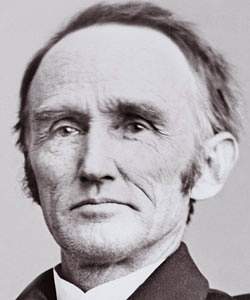Montgomery Blair (American National Biography)
Scholarship
In 1856 Blair became the counsel for the plaintiff Dred Scott, and though he lost this case before the proslavery Roger B. Taney Supreme Court, Blair argued the important principle that the slave Scott was entitled to his freedom by virtue of his residence in free territory. Blair also held that the Missouri Compromise prohibited slavery in the territories and that Congress had the authority to prohibit slavery there, a position that put him at odds with southern Democrats and that had been undermined in the 1854 Kansas-Nebraska Act.
Blair, along with his influential brother Francis Blair and his father [Francis Preston Blair], had come to oppose slavery and to support the return of freed blacks to Africa, the latter a policy that he believed would encourage southerners to free their slaves. Blair's views on slavery were representative of a body of border-state opinion, which opposed abolitionism and black equality as too extreme but which argued for a containment of slavery and its gradual end. In 1848 he was associated with the Free Soil party, attracted to that new organization during a period of party realignment by friends in New York. By 1852 he had returned to the Democratic party and was a delegate to its national convention. By 1860 he supported the Republican party and worked hard, though largely unsuccessfully, to organize this new political organization in Maryland.
Blair, along with his influential brother Francis Blair and his father [Francis Preston Blair], had come to oppose slavery and to support the return of freed blacks to Africa, the latter a policy that he believed would encourage southerners to free their slaves. Blair's views on slavery were representative of a body of border-state opinion, which opposed abolitionism and black equality as too extreme but which argued for a containment of slavery and its gradual end. In 1848 he was associated with the Free Soil party, attracted to that new organization during a period of party realignment by friends in New York. By 1852 he had returned to the Democratic party and was a delegate to its national convention. By 1860 he supported the Republican party and worked hard, though largely unsuccessfully, to organize this new political organization in Maryland.
Jean H. Baker, "Blair, Montgomery," American National Biography Online, February 2000, http://www.anb.org/articles/04/04-00112.html.





